Why Do Babies Cry in Their Sleep? Here Are 5 Reasons
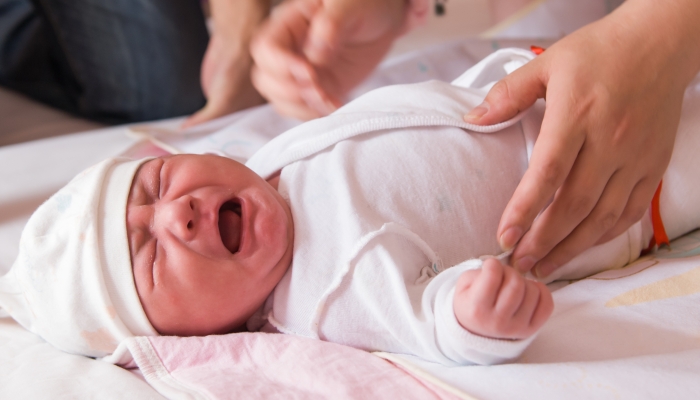
- Babies crying while asleep can be a part of normal infant sleep patterns.
- There are many understandable reasons why your baby might cry while asleep.
- You can try different soothing methods to help babies learn to go back to sleep on their own.
Newborn sleep patterns vary widely from an adult’s. For one, a young baby wakes from sleep more often, especially in the early days for night feedings. When newborn babies do sleep, they may appear to be restless sleepers, which is related to their immature nervous system.
If your baby’s sleep is punctuated by episodes of crying throughout the night and is shortening your own sleeping hours, you may wonder why babies cry in their sleep and when you can look forward to experiencing full nighttime sleep again.
There are a few different reasons why babies cry in their sleep—and you may be able to help them through it!
Sleep Cycles: When Do Babies Cry In Their Sleep?
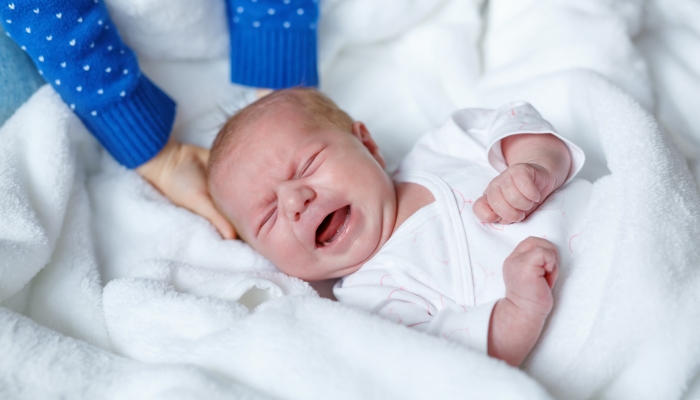
Most babies spend more time in the light sleep11. Pacheco, D., & Singh, A.. Infant sleep cycles: How are they different from adults? Sleep Foundation. 2023;. https://www.sleepfoundation.org/baby-sleep/baby-sleep-cycle portion of one sleep cycle as opposed to the deep sleep (non-rapid eye movement) portion.
During this phase of baby sleep, you may see that:
- Your baby begins crying.
- Your baby’s breathing changes to a shallow or irregular pattern.
- Your baby is grunting or making strange sounds.
- Your baby’s eyes move while they remain asleep, or they sleep with their eyes open.
More time in active or light sleep when babies sleep means more opportunities to experience brief waking periods and possible crying.
Is It Normal for Babies to Cry in Their Sleep?
Sometimes parents worry that nighttime crying while their baby remains asleep is a sign that their little one is experiencing a nightmare or night terror. While your baby’s cries may be disconcerting to other members of the household, chances are your little one, like most babies, isn’t having night terrors or even dreaming—at least, not in the way older children or adults do.
Interestingly, researchers McNamara et al, in their 2002 study Spontaneous arousal activity in infants during NREM and REM sleep22. McNamara, F., Lijowska, A. S., & Thach, B. T.. Spontaneous arousal activity in infants during NREM and Rem Sleep. The Journal of Physiology. 2002;538(1), 263–269. https://doi.org/10.1113/jphysiol.2001.012507 published in The Journal of Physiology, report that crying out in a loud voice, making strange sounds, altered breathing patterns, and even crying in their sleep are all normal features of active or rapid eye movement33. Blumberg, M. S., Lesku, J. A., Libourel, P.-A., Schmidt, M. H., & Rattenborg, N. C.. What is REM sleep?. Current Biology. 2020;30(1). https://doi.org/10.1016/j.cub.2019.11.045 (REM) sleep in newborns.
Why Do Babies Cry in Their Sleep?
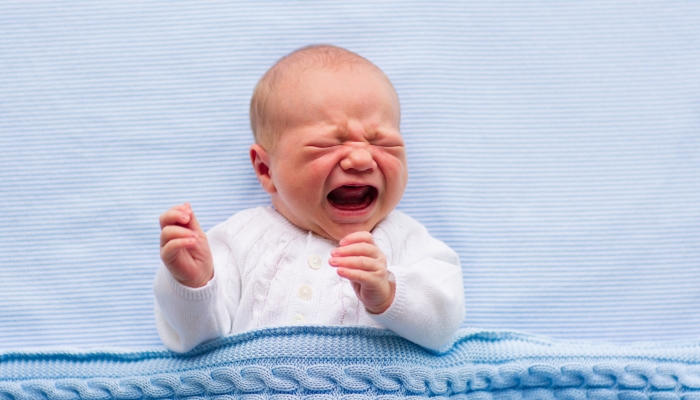
It’s normal for a young baby to cry in their sleep and it can happen for a variety of reasons. Possibilities include:
Gas Pain
The sensation of gas moving through a baby’s body or passing gas can be distressing for some infants, causing them to cry out.
Teething Pain
Teething babies can feel miserable as they cut those tiny milk teeth. In my experience, they always seem to be most unhappy at night.
While experts Dr. Michael Macknin and his colleagues reported in a 2000 study published in Pediatrics that sleep disturbance and teething are not statistically related44. Macknin, M. L., Piedmonte, M., Jacobs, J., & Skibinski, C.. Symptoms associated with infant teething: A prospective study. Pediatrics. 2000;105(4), 747–752. https://doi.org/10.1542/peds.105.4.747, the lived experience of teething infants and their families suggest otherwise.
Variations in Sleep Cycle
Some infants tend to wake briefly and cry as they shift from one sleep state to another.
Try to give your baby a chance to soothe themselves and go back to sleep before you swoop in to save them. Doing so will lead to better long-term sleep habits for your baby.
Bad Dreams
Childhood experts at Stanford Medicine Children’s Health report that night terrors55. Nightmares and Night Terrors. Stanford Medicine Children’s Health – Lucile Packard Children’s Hospital Stanford. https://www.stanfordchildrens.org/en/topic/default?id=nightmares-and-night-terrors-90-P02257 may happen more often if your child is overtired.
Try to ensure that your little one is getting enough sleep during the day in order to prevent nightmares and night terrors.
Sleep Regression
In the haze of caring for your newborn, you may hit a phase where your newborn is sleeping in a relatively predictable way for a few days to weeks. You’re enjoying some more rest, then suddenly, your baby experiences sleep regression—leaving both of you crying at night.
Sleep regression commonly happens throughout infancy and toddlerhood. While it may seem like it will last forever, be encouraged: You will sleep at night again!
Regardless of the reason your baby cries, your best response as a parent is to stay calm and respond appropriately to your baby’s needs. Your little one is doing their best to communicate a felt need, and they’re asking for your help in the only way they know how.
Should You Wake a Baby Crying in Their Sleep?
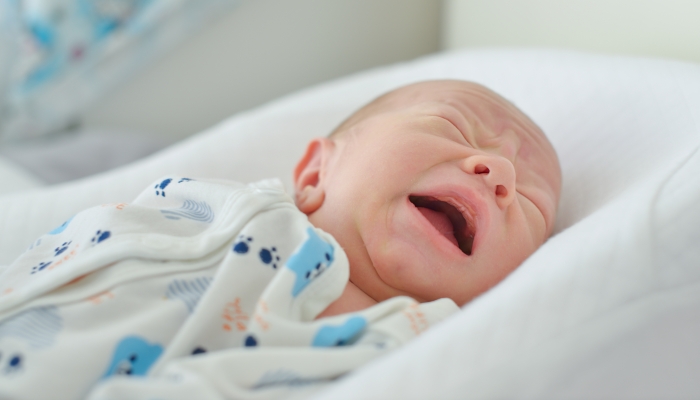
Though it may be tempting to wake your little one when they cry out in their sleep, most experts, such as Burnham and colleagues in a 2002 study66. Burnham, M. M., Goodlin-Jones, B. L., Gaylor, E. E., & Anders, T. F.. Nighttime Sleep-wake patterns and self-soothing from birth to one year of age: A longitudinal intervention study. Journal of Child Psychology and Psychiatry. 2002;43(6), 713–725. https://doi.org/10.1111/1469-7610.00076 published in The Journal of Child Psychology and Psychiatry, agree that it’s safe to give them a few minutes to sort themselves out.
Unnecessary stimulation can cause sleep-related issues and ultimately sabotage efforts to get your child to experience sound sleep throughout the night.
Give your baby an opportunity to engage in some self-soothing behaviors or even a brief awakening before dozing back off.
How Long Should You Let a Baby Cry in Their Sleep?
Babies experience a huge amount of brain growth and memory consolidation77. Pacheco, D., & Vyas, N.. Children and sleep. Sleep Foundation. 2023. https://www.sleepfoundation.org/children-and-sleep while they sleep. At times, this busy mental activity can cause result in a crying baby, even when they’re not completely awake.
It’s okay to let your little one have a few minutes to manage their waking and try to drift off again.
However, if your little one continues to cry for longer than ten minutes, gets increasingly distressed, shows signs of illness, or you have other concerns, do a brief check-in on your infant.
What to Do to Soothe a Baby Crying in Their Sleep
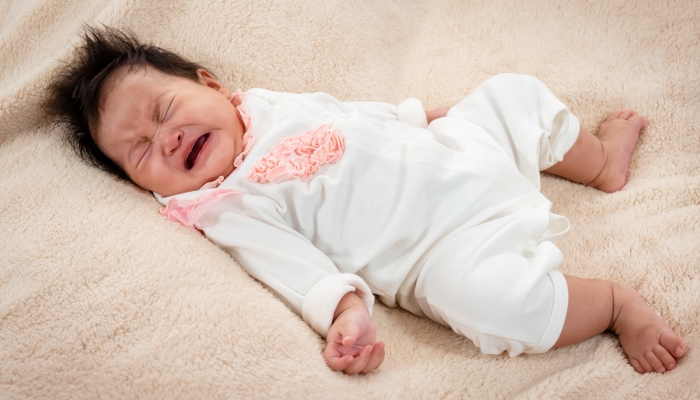
Looking for a few tips to help your baby stop crying in their sleep? When deciding how to respond to your little one, consider the following suggestions:
Know What’s Normal
When babies are approximately 4–6 months old, the need for nighttime feedings and a diaper change or two begins to diminish. By 8–1288. The First 12 Months: What & When to Feed Your Baby. UC Davis Medical Center. 2013. https://health.ucdavis.edu/food-nutrition/pdf/Pediatric%20-%20The%20First%2012%20Months.pdf months, it usually stops altogether and your baby will start sleeping fully through the night (6–8 hours in a row).
As your little one adjusts to this new pattern, they may still wake and whimper for a few minutes, then settle back down and fall asleep. Giving your baby time to figure out these new sleep patterns may result in better sleep habits for both of you.
Sleep Train
A variety of sleep training methods have been suggested to aid your baby in falling asleep (and hopefully, staying asleep!) on their own.
Sleep training methods include:
- Cry It Out: Perhaps the most controversial of sleep training methods, cry it out (CIO) is used largely because it tends to work within a few days of starting training. Sleep-deprived parents may appreciate it for this reason, while others feel it’s unnecessarily rough on everyone involved. In simple terms, this method is based on putting your baby to bed drowsy and leaving the room without returning, no matter how much your baby cries.
- Pick Up, Put Down: A milder alternative to CIO, pick up put down training can be used for both bedtime and naps. This method involves picking up the baby and comforting them, then placing them back in a sleeping position as soon as they’re calm and leaving the room.
- The Chair Method: This form of gentle sleep training involves putting your baby to bed while they’re drowsy (but not fully awake) and sitting in a chair next to your baby’s crib. As your baby quiets and begins to fall asleep, you stay in the chair, then leave when they’re completely asleep.
- Fading Sleep Training: The simplest of all sleep training forms, the fading method encourages parents to explore the biorhythms of their baby and gradually ease them into a sleeping schedule that also coincides with the routines of the family.
Regardless of what method, if any, you choose for your baby, remember that sleep training is recommended for older babies who no longer need to wake at night for feedings in order to grow. Each method also relies heavily on the use of a sleep routine or bedtime routine to help signal the brain that it’s time for rest.
Avoid Stimulation
Remember that night waking and, at times, crying are normal parts of young babies learning to sleep on their own.
When responding to your crying baby during the night, try to avoid bright lights, loud voices, or other activities that will rouse your baby further.
Create a Quality Sleep Environment
Your baby is more likely to enter a relaxed state and enjoy a good night’s sleep if their room is:
- Dim
- Quiet
- Cool
- Contains their own safe sleep area
Also consider a sleep sack or wearable blanket to keep your baby comfortably warm and safe during nighttime hours.
Your child’s pediatrician may also have ideas on how to soothe your baby who is crying in their sleep. Contact your healthcare provider for other suggestions on how to help your little one.
A baby who cries often during the night can be taxing for even the most seasoned parent. Be patient with your little one as they learn to quiet themselves and go back to sleep on their own.
References
- Pacheco, D., & Singh, A. (2023, April 26). Infant sleep cycles: How are they different from adults? Sleep Foundation. https://www.sleepfoundation.org/baby-sleep/baby-sleep-cycle
- McNamara, F., Lijowska, A. S., & Thach, B. T. (2002). Spontaneous arousal activity in infants during NREM and Rem Sleep. The Journal of Physiology, 538(1), 263–269. https://doi.org/10.1113/jphysiol.2001.012507
- Blumberg, M. S., Lesku, J. A., Libourel, P.-A., Schmidt, M. H., & Rattenborg, N. C. (2020). What is REM sleep? Current Biology, 30(1). https://doi.org/10.1016/j.cub.2019.11.045
- Macknin, M. L., Piedmonte, M., Jacobs, J., & Skibinski, C. (2000). Symptoms associated with infant teething: A prospective study. Pediatrics, 105(4), 747–752. https://doi.org/10.1542/peds.105.4.747
- Nightmares and Night Terrors. Stanford Medicine Children’s Health – Lucile Packard Children’s Hospital Stanford. (n.d.). https://www.stanfordchildrens.org/en/topic/default?id=nightmares-and-night-terrors-90-P02257
- Burnham, M. M., Goodlin-Jones, B. L., Gaylor, E. E., & Anders, T. F. (2002). Nighttime Sleep-wake patterns and self-soothing from birth to one year of age: A longitudinal intervention study. Journal of Child Psychology and Psychiatry, 43(6), 713–725. https://doi.org/10.1111/1469-7610.00076
- Pacheco, D., & Vyas, N. (2023, June 1). Children and sleep. Sleep Foundation. https://www.sleepfoundation.org/children-and-sleep
- The First 12 Months: What & When to Feed Your Baby. UC Davis Medical Center. (2013). https://health.ucdavis.edu/food-nutrition/pdf/Pediatric%20-%20The%20First%2012%20Months.pdf

The information WonderBaby provides is not intended to be, and does not constitute, medical or other health advice or diagnosis and should not be used as such. Always consult with a qualified medical professional about your specific circumstances.
Related Posts
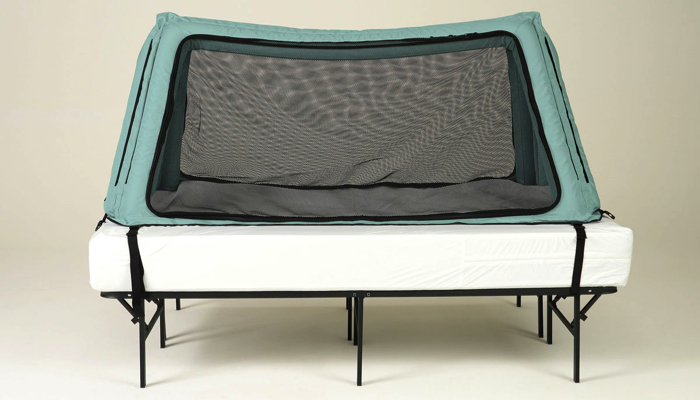
Sleep, Special Needs
Safe Place Bedding Travel Bed Review
Traveling with a special needs child can be stressful! Having a safe, durable, and easy to use travel bed can make traveling so much easier!
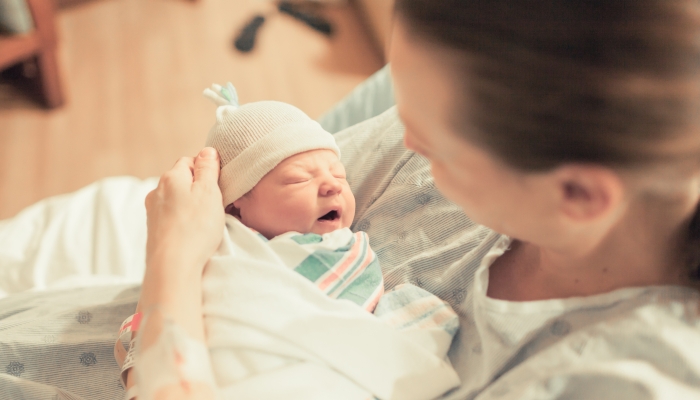
Sleep, Special Needs
Sleep Regimen for Premature Babies: Special Considerations
It can take premature babies much longer than their full-term peers to sleep for long stretches. A preemie sleep schedule may encourage better sleep.
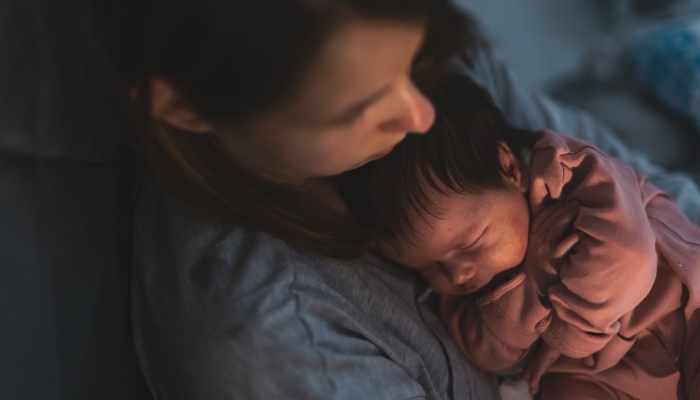
Sleep
Mastering the Bedtime Routine: 3 Tips for a Peaceful Night’s Sleep
From around six weeks, a newborn bedtime routine can help your baby learn the difference between day and night and prepare for a restful night’s sleep.